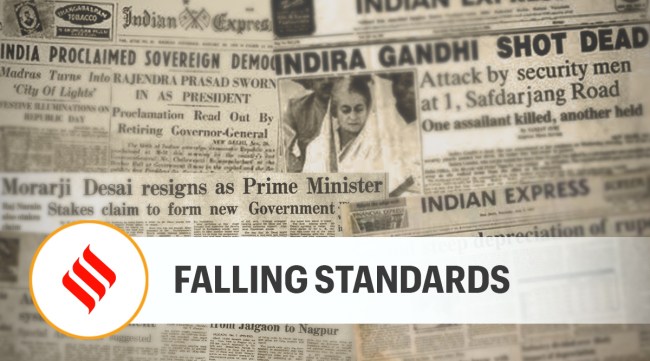Opinion Govt finally admits irregularities in IIM-Rohtak director appointment; the Board should rethink his second term
Whether it was political influence or corruption that allowed Sharma to game the system, or convinced the system to lower its scrutiny, the revelations now send a warning to the IIMs.
 A second class undergraduate degree per se may be a silly reason to block the best candidate but if that's the criterion, any waiver needs a reasoned explanation to ensure that the playing field is level.
A second class undergraduate degree per se may be a silly reason to block the best candidate but if that's the criterion, any waiver needs a reasoned explanation to ensure that the playing field is level.
The disclosure, made to the Punjab and Haryana High Court, that the director of IIM-Rohtak was ineligible for a post he held for five years, must embarrass both the government and India’s premier institutes of management. It reveals extraordinary lapses and loopholes in the appointment process, first reported by this newspaper, and must prod the government to take swift action against those who looked the other way or let it happen. Even though IIM-Rohtak director Dheeraj Sharma failed to meet a minimum criterion — he secured a second class in his undergraduate examinations, instead of the first class required — his name was green-lit by the Appointments Committee of the Cabinet (ACC) headed by the Prime Minister, as was the norm till the IIM Act came into being. A second class undergraduate degree per se may be a silly reason to block the best candidate but if that’s the criterion, any waiver needs a reasoned explanation to ensure that the playing field is level.
Not only that didn’t happen, Sharma refused to submit his undergraduate degree to the Ministry of Education despite three reminders. And when Sharma’s candidature was challenged in court, the Ministry of Education last year consistently denied any irregularity and asked for the plea to be dismissed. It has now filed an affidavit, conceding that it was wrong. But Sharma has now got a second term as the IIM-Rohtak director — even if his first term stands invalidated. While scams involving inflated degrees and qualifications are not unheard of in many colleges, the unearthing of such a deceit at an IIM does dim its success story. Justly celebrated as institutes of academic excellence, the IIMs pride themselves on being uncompromising when it comes to talent, and discouraging mediocrity. They have also fought a long battle to protect and preserve their academic autonomy, even if that has involved wrangles with the government. But the appointment —and now, a second term — of the IIM-Rohtak director suggests a breakdown of a system of checks and balances, and a culture of procedural impropriety.
Whether it was political influence or corruption that allowed Sharma to game the system, or convinced the system to lower its scrutiny, the revelations now send a warning to the IIMs. Since 2018, the IIMs have the power to appoint directors, chairpersons and board members, without any role of the government. But such processes must remain open, transparent and credible — and be seen as such. For the IIMs, the task now is to tighten the verification processes. Both IIM-Rohtak and the Ministry of Education must investigate the sins of omission and commission that led to this scandal. Yes, under the IIM Act, the institute has autonomy to choose its leader but does it want to give a second term to one who, on evidence, has been, dodgy? For, this has little to do with the transcripts of an undergraduate degree, this is about academic honesty and integrity.
This editorial first appeared in the print edition on March 18, 2022 under the title ‘Falling standards’.






